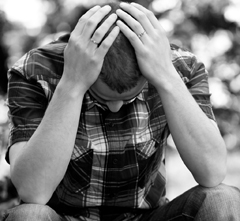
Traumatic events can be either physical or mental, ranging from farm accidents and car accidents through to bushfires, floods, the death of someone close to you, or relationship problems. Traumatic events can cause immediate, delayed and/or long-term reactions. Each person will react differently to a traumatic event, and no reaction is right or wrong.
You might feel physical reactions like nausea, headaches or lack of appetite. You might also experience psychological reactions like confusion, forgetfulness, ruminating about the event, or a search for answers about why the event happened. Other common reactions to trauma include guilt, depression and anger. You might also feel that getting back into everyday tasks is your way of responding to trauma. You are likely to find that people around you all react to distressing events very differently, and recover in different ways and over different periods of time. Individuals will need different types and levels of support at different points in time. Don’t judge yourself or others for these varied responses. Most people, given time, will recover by using their existing coping strategies or with the support of family and friends.
Beware of stress overload, when your body is pushed beyond its limits. Take time out.
Trauma – reaction and recovery
It is normal to have strong emotional or physical reactions following a distressing event. The intensity of a reaction differs from person to person, but some reactions last for days, weeks or even longer. On most occasions though, these reactions subside as a part of the body’s natural healing and recovery process. Your own coping style is likely to have an influence on how your child or teenager responds to a traumatic event.
There are strategies to help people cope with and recover from these experiences. Find out more about this topic on Better Health Channel
Sometimes reactions to trauma are delayed or are experienced over a longer period of time and may develop into post traumatic stress disorder (PSTD). This is when a person continues to relive the traumatic event through upsetting memories, nightmares or flashbacks and feels physically and emotionally distressed when reminded of the event. Other symptoms of PTSD can include memory loss about the event, feeling socially isolated, sleep difficulties, feeling anxious and becoming angry easily. You may be experiencing post traumatic stress disorder if you have experienced these symptoms for longer than a few weeks. Effective treatments are available to help people through this.
Be aware of your reactions, your stress levels and your ability to cope following a traumatic experience and seek support if difficulties persist over time.
If you are struggling to cope after a traumatic event, make an appointment with your GP.
Fast facts:
- Trauma can cause strong physical, psychological and emotional reactions. This is a normal reaction to events that cause shock and extreme stress.
- Everyone will react differently—but support (in many forms) is important for everyone immediately after the event and further down the track.
- Don’t hesitate to seek professional help if you feel you need it immediately or if you don’t begin to return to normal after three or four weeks.
- Avoid stress overload—you need to rest, eat well, sleep well and still find things to enjoy after a traumatic experience.
- Avoid unnecessary exposure to social media/media commentary of a traumatic event—it can become overwhelming.
- Sometimes traumatic experiences can affect us for a long time.
References used for this topic
More information:
Trauma and Grief Network
Kids in rural and remote areas: Coping with tough times
Beyond Blue
What is PTSD?
Phoenix Australia – Centre for Posttraumatic Mental Health
Posttraumatic stress disorder (PTSD)
Phoenix Australia – Centre for Posttraumatic Mental Health
Recovering from Trauma
Australian Psychological Society
Understanding and managing psychological trauma
Better Health Channel
Trauma – reaction and recovery
Clinical care:
Phoenix Australia: Centre for Posttraumatic Mental Health
Australian Guidelines for the Treatment of Acute Stress Disorder and Posttraumatic Stress Disorder
Medical Journal of Australia
Treating adults with acute distress disorder and post-traumatic stress disorder in general practice
Research & reviews:
International Journal of Environmental Research and Public Health
Key Risk Factors Affecting Farmers’ Mental Health: A Systematic Review
The Medical Journal of Australia
Drought-related stress among farmers: findings from the Australian Rural Mental Health Study
BMC Public Health
Long-term effects of lifetime trauma exposure in a rural community sample
Experimental Neurology
Understanding resilience: New approaches for preventing and treating PTSD
|
|